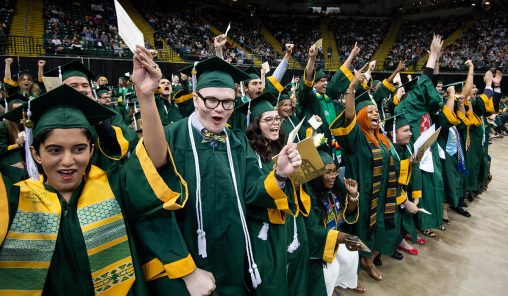
Wright State will hold its spring graduate commencement ceremony on Friday, April 26, at 7 p.m. and its undergraduate commencement ceremony on Saturday, April 27, at 10 a.m. in the Wright State University Nutter Center. (Photo by Erin Pence)
Nearly 1,500 students are expected to graduate during Wright State University’s spring commencement ceremonies in the Wright State University Nutter Center on Friday, April 26, and Saturday, April 27.
The 1,494 graduates will join more than 120,000 Wright State alumni who are making a difference throughout Raider Country, all over Ohio, across the nation and around the world.
Wright State will hold two spring commencement ceremonies in the Nutter Center:
Graduate ceremony: Friday, April 26, at 7 p.m.
Undergraduate ceremony: Saturday, April 27, at 10 a.m.
Tickets are not required to attend, but graduates are asked to limit their number of guests to no more than 14 people so that everyone can be accommodated. Seating in the Wright State Nutter Center will be first-come, first-served. Doors will open 90 minutes prior to the start of each ceremony.
The commencement ceremonies can be watched online at wright.edu/streaming and on the university’s Facebook page and YouTube channel. The recorded videos will also be available on Wright State’s YouTube channel after the ceremonies.
The commencement ceremonies will feature a short congratulatory video from Ohio Gov. Mike DeWine.
Wright State’s spring class of 2024 includes graduates with 990 bachelor’s degrees, 479 master’s degrees, 30 associate degrees and 17 doctoral degrees.
The classes feature 248 international students from 22 different countries. India boasts the largest number of international graduates, with 205.
Eight students are the youngest graduates of the class at 19 years old. Four of them earned bachelor’s degrees in biological sciences, biochemistry and molecular biology, physiology and neuroscience, and technical and applied studies, respectively. Four others earned associate degrees in business and administration. The oldest graduate is 67, having earned a bachelor’s degree in music.
Graduates by college:
- College of Health, Education and Human Services: 379
- College of Engineering and Computer Science: 333
- College of Liberal Arts: 216
- College of Science and Mathematics: 198
- Raj Soin College of Business: 177
- Lake Campus: 146
- Boonshoft School of Medicine: 49
The ceremonies will also be broadcast live on WSU-TV on Time Warner Cable channel 21.105 in the university’s residence halls and Fairborn and regionally on AT&T Uverse channel 99 in the Dayton tab.
Notable 2024 graduates
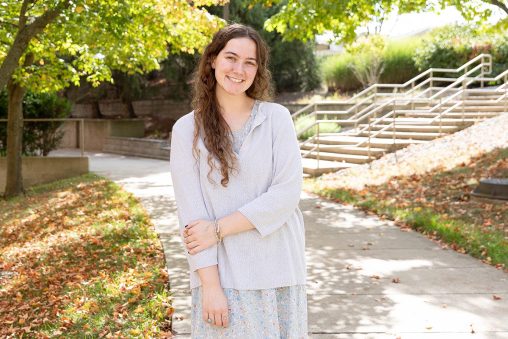
Alexis Lewis will graduate with bachelor’s degrees in English, with a concentration in professional and technical writing, and French.
Alexis Lewis
Alexis Lewis, a dual English and French major at Wright State who also doubled as the editor-in-chief of the Wright State Guardian, has made a habit of arriving on campus most days at 8 a.m. and not leaving until 8 p.m. or later.
When not working on her Honors thesis project or guiding young student journalists, she also worked on writing and editing projects for the Boonshoft School of Medicine.
A native of Christiansburg in Champaign County, Lewis graduated from Graham High School in 2020 as class valedictorian. Listening to her brother’s glowing reviews and after receiving a full academic scholarship, Lewis followed in her sibling’s footsteps and enrolled at Wright State.
“I’ve always loved reading and writing,” said Lewis. “I love language itself. You can see the power in words. The combination of professional and technical writing allows me to write about what interests me while not necessarily being a subject matter expert.”
Lewis stumbled into an interest in French after watching an online video featuring Kirsten Halling, Ph.D., professor of French, giving a presentation and was immediately hooked.
Her interests were further piqued after participating in a three-week faculty-led Ambassador Program to study abroad in France. The group taught English to students in Nice the first week and then spent the following two weeks in Paris.
“It was the best experience I ever had,” Lewis said. “The fact that I was able to immerse myself in another culture was just awesome.”
She also found herself quickly immersed at the Guardian when she pursued a sports writing role her junior year but ended up joining the media organization as managing editor. She was promoted to editor-in-chief this year.
Lewis managed a team of 10 to 11 writers that conducted research, writing, editing, gathered sources, determined the scope of stories and curated ideas for engagement.
Lewis hopes to join a nonprofit organization serving the Dayton region after graduation. A return trip to France to teach English might just be in her future too.
Gary Neal
Sometimes when walking the path toward your future, you discover a side road that takes you in a direction you hadn’t considered. Gary Neal Jr., a mechanical engineering major at Wright State, found that side road during an internship with GE Aerospace.
A native of Columbus, Neal was introduced to engineering in high school through Project Lead the Way, a nonprofit organization that provides STEM courses and development for elementary, middle and high school students.
“Mechanical engineering appealed to me because it is dispersed into all of the other engineering fields and would give me the broadest background,” said Neal.
As a student at Wright State, Neal participated in several organizations that helped him along his journey, including the National Society for Black Engineers, with which he served as treasurer and president. That is where he discovered the opportunity to intern with GE Aerospace.
Neal said both his academic and extracurricular activities at Wright State helped prepare him for the real world as well as nurturing his leadership skills.
In addition to serving in leadership roles with the National Society of Black Engineers, Neal served as secretary and president of the Black Student Union at Wright State.
During his tenure as president, the Black Student Union was named the organization of the year and earned a program of the year award for its Black Reality Talks series. Neal described the talks as open discussions among students, staff, faculty and administrators with the goal of problem-solving and making sure student voices have a safe place to be heard.
He said he enjoyed the opportunities that both organizations gave him to help play a role in other students’ academic and professional success, as well as giving him the confidence to embrace a leadership role, a skill he believes will serve him well in his career.
After graduation, Neal hopes to participate in a leadership rotational program either with GE Aerospace or another company and plans to eventually earn an MBA.
Drew Sprenkel
It’s not unusual for high school students to take college courses to accelerate their higher education. It’s also not unusual for students to be under the mentorship of someone in their chosen fields.
But then there’s Drew Sprenkel, who at the age of 19 will graduate with a bachelor’s degree in physiology and neuroscience. Sprenkel earned an associate degree in science before she received her high school diploma. And her mentor at Wright State is none other than Sue Edwards, Ph.D., president of Wright State and a fellow neuroscience scholar.
“Neuroscience is the perfect science because it’s the perfect combination of biology and psychology,” Sprenkel said. “I enjoy learning about the nervous system. I’m passionate about that.”
Because she is in the combined undergraduate and graduate program, Sprenkel will continue at Wright State to pursue a master’s degree in physiology and neuroscience.
Edwards, who earned a master’s degree in neuroscience from The University of Melbourne in her native Australia, became Sprenkel’s mentor almost by accident.
Last spring Sprenkel was invited to a science, technology, education and math mentoring matchup event.
“I went because there was a book list there that I wanted,” she recalled. “I didn’t think I needed a mentor. But I walked out with one of the best mentors I could’ve received.”
In talking with available mentors, Sprenkel said, “I didn’t know that she was the president when I was talking with her. I put her on my list of three possible mentors, not knowing she was Wright State’s president.”
The Edwards-Sprenkel connection was made, and they began meeting in person once or twice a month, usually in Edwards’s office.
“We talked a lot about mindset, how to get the best out of the learning experience, about opportunities and getting connected to the campus,” Sprenkel said.
Sprenkel’s endgame is to be a physician.
“Going to med school and being a doctor is in my DNA. It’s something I want to do,” she said. “I would love to go to the Mayo Clinic or Johns Hopkins, but I have a personal connection to where I am now.”
“I have absolutely found Wright State to be innovative in my education,” she said. “There is such an abundance of opportunities such as my connection to the research lab, ability to work as university staff by tutoring and study coaching, and my volunteering with neuro lab and other events that have helped me explore my interests in unique ways.”
Josh Hivner
Josh Hivner, a biological sciences major in Wright State’s College of Science and Mathematics, spent seven weeks last spring in Thailand studying coral reefs at his own expense.
The data he compiled and continues to analyze became the basis of his undergraduate thesis, which looked at the health not only of the coral reefs but also the planet.
“Conservation biology inspires me,” said the Huber Heights native. “It’s important that we take care of what we have here on Earth.”
When he returned to Wright State, Hivner dived into scholarly research and began compiling the data. His goal was to find ways to protect the health of coral reefs.
Coral health is important to oceanic health, something that is of greater worldwide concern.
“The oceans are very important to regulating climate on Earth,” Hivner said. “They’re our buffer for all the things that we’re doing to harm the environment with carbon emissions. There will come a point when things are going to get worse quickly.”
After graduation, he plans to continue his studies in graduate school and pursue a master’s in biology focusing on human impacts on aquatic systems.
“I’d like to broaden my experience a little more and continue research through marine biology or biological sciences,” he said.
Hivner said Wright State’s professors and staff have helped him on his marine journey.
“Everyone is very enthusiastic and willing to help,” he said. “Everyone’s been so accommodating for me.”

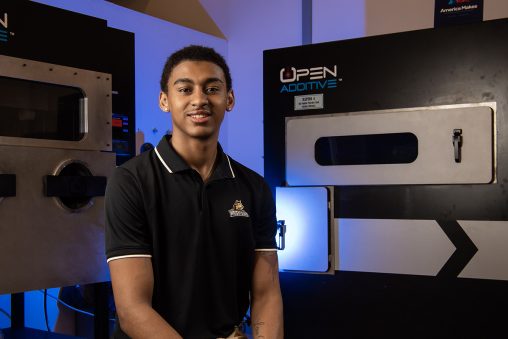
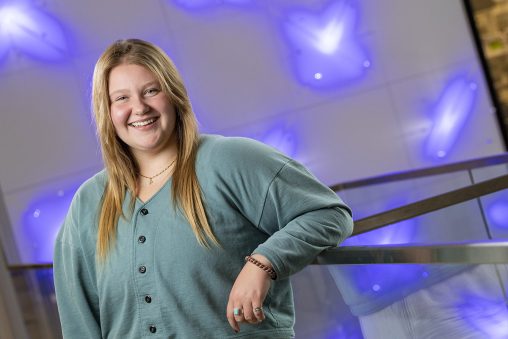
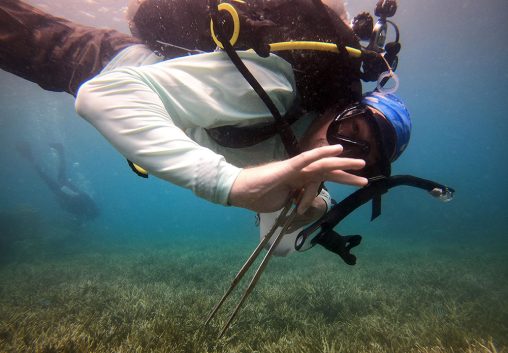
 Wright State alum Lindsay Aitchison fulfills childhood space-agency dream
Wright State alum Lindsay Aitchison fulfills childhood space-agency dream  Wright State business professor, alumnus honored by regional technology organizations
Wright State business professor, alumnus honored by regional technology organizations  Wright State University Foundation awards 11 Students First Fund projects
Wright State University Foundation awards 11 Students First Fund projects  Gov. DeWine reappoints Board Treasurer Beth Ferris and names student Ella Vaught to Wright State Board of Trustees
Gov. DeWine reappoints Board Treasurer Beth Ferris and names student Ella Vaught to Wright State Board of Trustees  Joe Gruenberg’s 40-Year support for Wright State celebrated with Honorary Alumnus Award
Joe Gruenberg’s 40-Year support for Wright State celebrated with Honorary Alumnus Award 